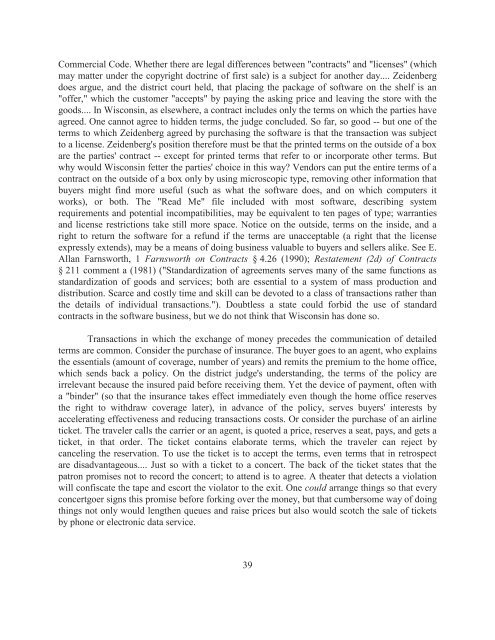Sales and Leases - A Problem-based Approach, 2016a
Sales and Leases - A Problem-based Approach, 2016a
Sales and Leases - A Problem-based Approach, 2016a
Create successful ePaper yourself
Turn your PDF publications into a flip-book with our unique Google optimized e-Paper software.
Commercial Code. Whether there are legal differences between "contracts" <strong>and</strong> "licenses" (which<br />
may matter under the copyright doctrine of first sale) is a subject for another day.... Zeidenberg<br />
does argue, <strong>and</strong> the district court held, that placing the package of software on the shelf is an<br />
"offer," which the customer "accepts" by paying the asking price <strong>and</strong> leaving the store with the<br />
goods.... In Wisconsin, as elsewhere, a contract includes only the terms on which the parties have<br />
agreed. One cannot agree to hidden terms, the judge concluded. So far, so good -- but one of the<br />
terms to which Zeidenberg agreed by purchasing the software is that the transaction was subject<br />
to a license. Zeidenberg's position therefore must be that the printed terms on the outside of a box<br />
are the parties' contract -- except for printed terms that refer to or incorporate other terms. But<br />
why would Wisconsin fetter the parties' choice in this way? Vendors can put the entire terms of a<br />
contract on the outside of a box only by using microscopic type, removing other information that<br />
buyers might find more useful (such as what the software does, <strong>and</strong> on which computers it<br />
works), or both. The "Read Me" file included with most software, describing system<br />
requirements <strong>and</strong> potential incompatibilities, may be equivalent to ten pages of type; warranties<br />
<strong>and</strong> license restrictions take still more space. Notice on the outside, terms on the inside, <strong>and</strong> a<br />
right to return the software for a refund if the terms are unacceptable (a right that the license<br />
expressly extends), may be a means of doing business valuable to buyers <strong>and</strong> sellers alike. See E.<br />
Allan Farnsworth, 1 Farnsworth on Contracts § 4.26 (1990); Restatement (2d) of Contracts<br />
§ 211 comment a (1981) ("St<strong>and</strong>ardization of agreements serves many of the same functions as<br />
st<strong>and</strong>ardization of goods <strong>and</strong> services; both are essential to a system of mass production <strong>and</strong><br />
distribution. Scarce <strong>and</strong> costly time <strong>and</strong> skill can be devoted to a class of transactions rather than<br />
the details of individual transactions."). Doubtless a state could forbid the use of st<strong>and</strong>ard<br />
contracts in the software business, but we do not think that Wisconsin has done so.<br />
Transactions in which the exchange of money precedes the communication of detailed<br />
terms are common. Consider the purchase of insurance. The buyer goes to an agent, who explains<br />
the essentials (amount of coverage, number of years) <strong>and</strong> remits the premium to the home office,<br />
which sends back a policy. On the district judge's underst<strong>and</strong>ing, the terms of the policy are<br />
irrelevant because the insured paid before receiving them. Yet the device of payment, often with<br />
a "binder" (so that the insurance takes effect immediately even though the home office reserves<br />
the right to withdraw coverage later), in advance of the policy, serves buyers' interests by<br />
accelerating effectiveness <strong>and</strong> reducing transactions costs. Or consider the purchase of an airline<br />
ticket. The traveler calls the carrier or an agent, is quoted a price, reserves a seat, pays, <strong>and</strong> gets a<br />
ticket, in that order. The ticket contains elaborate terms, which the traveler can reject by<br />
canceling the reservation. To use the ticket is to accept the terms, even terms that in retrospect<br />
are disadvantageous.... Just so with a ticket to a concert. The back of the ticket states that the<br />
patron promises not to record the concert; to attend is to agree. A theater that detects a violation<br />
will confiscate the tape <strong>and</strong> escort the violator to the exit. One could arrange things so that every<br />
concertgoer signs this promise before forking over the money, but that cumbersome way of doing<br />
things not only would lengthen queues <strong>and</strong> raise prices but also would scotch the sale of tickets<br />
by phone or electronic data service.<br />
39


















